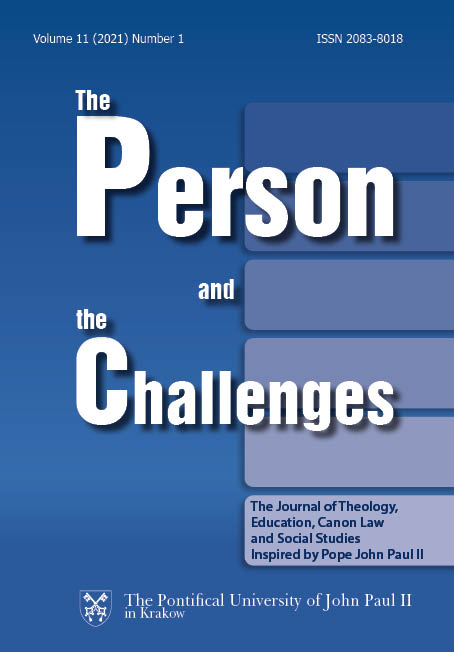What Happened to Our Will to Serve in the West? Secularization, Individualism, Family and the Decline of the Civilization
DOI:
https://doi.org/10.15633/pch.3886Słowa kluczowe:
Western Civilization, relationships, will to serve, secularization, individualism, familyAbstrakt
The West is changing profoundly and so is its cultural and community-building potential. When we observe the transformations of this civilization in such aspects as fertility rates, marriage and divorce statistics, single-parenthood and out-of-wedlock births, birth control and euthanasia, one may look for a common explanation of this phenomena. It seems that people care less for each-other and more about themselves, and spend less time in long-term relationships which demand engagement, devotion and readiness to serve. At the same time, they do not seem to be happier or wealthier.
According to the thesis of my paper, in order to understand and explain the changes listed above it is necessary to analyze them in a wider framework of socio-cultural shifts that took place in recent centuries in the West. This paper concentrates on such phenomena as secularization, rise of individualism and transformations of family life. These elements are going to be tested as key processes which triggered and facilitated profound transformations of culture and social structure which manifest themselves today in such alarming trends as, for example, demographic imbalance due to declining fertility and population ageing, decreasing human capital due to low-quality socialization, population control as well as eugenic practices or feminization of poverty. It seems that the current socio-economic condition of the West calls for critical and thorough analysis of dominating norms, values and beliefs which influence everyday decisions and the actions of millions of people who, in general, do not want to see the decline of their welfare and well-being.
The aim of this paper is to engage and combine different findings from such disciplines as economics, psychology, history, sociology and cultural studies in order to present the will to serve which can be described as a foundational dimension and condition
of life.
Bibliografia
Beck U. and Beck-Gernsheim E., Individualization, Institutionalized Individualism and its Social and Political Consequences, SAGE Publications, London · Thousand Oaks · New Delhi 2002.
Berger P.L., Luckmann T., The Social Construction of Reality: A Treatise in the Sociology of Knowledge, Penguin Books 1991.
Boulding K.E., Beyond Economics. Essays on Society, Religion and Ethics, The University of Michigan Press, Ann Arbor 1968.
Delsol C., The Unlearned Lessons of the Twentieth Century: An Essay on Late Modernity, ISI Books 2006.
Goldman D.P., It’s Not the End of the World. It’s the End of You. New York: RVP Publishers 2011.
Heckman J.J., Invest in early childhood development: reduce deficits, strengthen the economy. The Heckman Equation, 2012. Available at: http://heckmanequation.org/content/resource/invest-early-childhood-development-reduce-deficits-strengthen-economy (30.03.2016).
Inglehart R., Modernization and Postmodernization, in: B.E. Brown (ed.), Comparative Politics: Notes and Readings, Thomson/Wadsworth, Belmont, California 2006.
Marody M., Giza-Poleszczuk A., Przemiany więzi społecznych. Zarys teorii zmiany społecznej, Wydawnictwo Naukowe Scholar, Warszawa 2004.
Menger C., Principles of Economics, Ludwig von Mises Institute, Auburn 2007.
Pearlstein M., From Family Collapse to America’s Decline. The Educational, Economic and Social Costs of Family Fragmentation, Rowman & Littlefield Education, Lanham – New York – Toronto – Plymouth, UK 2011.
Putnam R.D., Bowling Alone: The Collapse and Revival of American Community, Simon & Schuster, New York 2001.
Razum R., Mandarić B.V., Young People, Faith, Spirituality, Ecclesiality, “Bogoslovska smotra” Vol. 84 (2014) No 1, pp. 1083–1108.
Relationships Foundation International, The Penumbra Effect. Family-centred Public Policy, Cambridge 2009. Available at: https://relationshipsfoundation.org/publications/the-penumbra-effect-family-centred-public-policy/ (15.09.2020).
Roback-Morse J., Love & Economics: Why the Laissez-Faire Family Doesn’t Work, Spence Publishing Company, Dallas 2001.
Simonič B., Empathetic Parenting and Child Development, “The Person and the Challenges” Vol. 5 (2015) No 2, pp. 109–121.
Stala J., Der gesellschaftlich-kulturelle Kontext der aktuellen Gefährdungen für die religiöse Erziehung und Bildung in der Familie, „The Person and the Challenges” Vol. 3 (2013) No 1, pp 251–266.
Taylor C., A Secular Age, The Belknap Press of Harvard University Press, Cambridge, Massachusetts, and London, England 2007.
Taylor C., Sources of the Self: The Making of the Modern Identity, Harvard University Press, Cambridge, Massachusetts 1989.
Pobrania
Opublikowane
Numer
Dział
Licencja
Autorzy publikujący w czasopiśmie udzielają jego wydawcy zgody o następującej treści:
- Autor zachowuje autorskie prawa majątkowe do utworu, a jednocześnie udziela wydawcy czasopisma zgody na jego pierwszą publikację w wersji drukowanej i wersji online na licencji Creative Commons Uznanie autorstwa 4.0 Międzynarodowe oraz zgody na wykonywanie opracowań, w tym przekładów.
- Autor ma możliwość udzielania zgody niewyłącznej na opublikowanie utworu w wersji, która ukazała się w czasopiśmie (np. zamieszczenia go w repozytorium instytucjonalnym lub opublikowania w książce), wraz z informacją o jego pierwszej publikacji w czasopiśmie.
- Autor może umieścić swój utwór online (np. w repozytorium instytucjonalnym lub na swojej stronie internetowej) jeszcze przed zgłoszeniem utworu do czasopisma.

